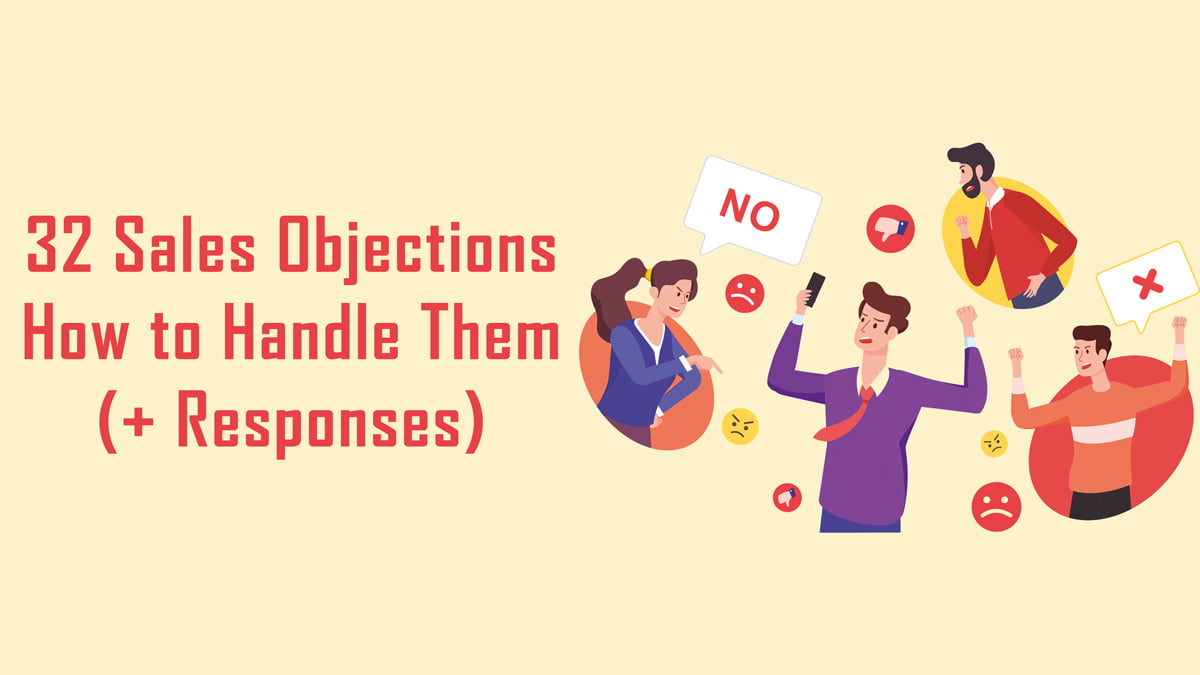Table of Contents
What is a Sales Objection?
A sales objection is a challenge or concern raised by a potential customer during the sales process. It indicates a barrier that prevents the prospect from making a purchase decision at that moment
We call sales objections as a “Show Stopper”.
These objections can come in various forms, such as questions, concerns, doubts, or hesitations.
Sales objections can arise at any stage of the sales cycle until you have closed the deal.
It’s important to note that objections are not always negative; they can also be seen as opportunities for further clarification and understanding.
Interestingly according to Clari after they analyzed 224k+ sales calls in 2020 found that the win rates go up by around 30% whenever a prospect raises an objection.
As a smart salesperson, you need to be prepared to handle sales objections effectively whenever it arises.
During our sales consulting engagements, we always recommend sales teams to pre-empt the objections so that they are already well prepared to handle them effectively.
By addressing them head-on, you can demonstrate your knowledge, build trust/ credibility, and ultimately close the deal.
Test Your Objection Handling Skills!
4 Types of Sales Objections
So there are usually four types of objections in sales that you will come across. Any of the objections you hear will fall in one of the 4 buckets.
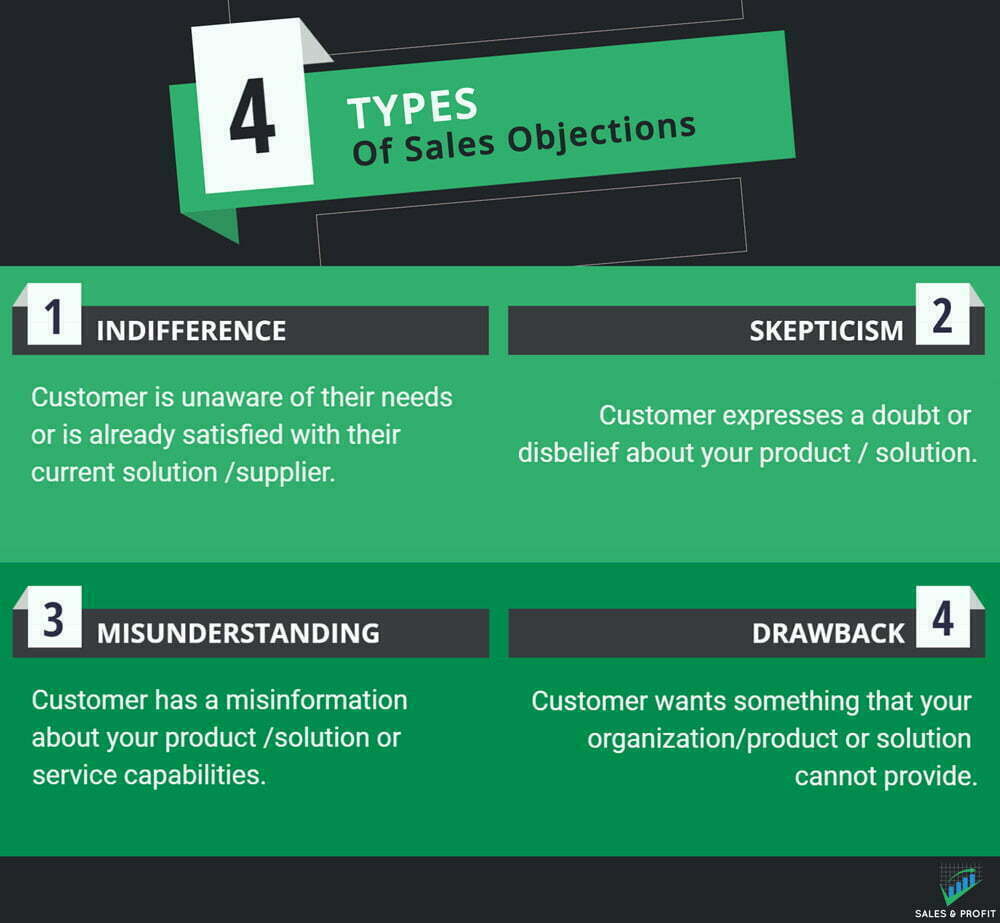
1. Indifference
Indifference arises when a customer is completely unaware of their need for a product or service like yours.
You think that your product/ service can support them in improving their productivity, image, revenue or saving cost.
But they don’t think the same.
Because they think they don’t have the problem in the first place or the problem is not urgent for them.
Or, Indifference also arises when they already have a supplier doing that for them and are not looking for a change.
Examples of Indifference
- “I’m not interested.” Or “Its not in my priority right now.”
- “I’m happy with my current provider.”
2. Skepticism
Skepticism is when a prospect has a doubt or disbelief about you, your solution, or your company.
They simply don’t believe what a seller is saying or the capabilities of our solution.
This can arise from various reasons, such as past experiences, lack of awareness about the solution or they haven’t heard about your company before.
A Skepticism also arises when a seller does oversell of product features.
If you’re overselling your product features, then might arise a doubt in the customer’s mind like “something is wrong somewhere” or “it’s too good to be true”
Examples of Skepticism
- “I’ve never heard of your company.”
- “I’m not sure it will work for me.”
3. Misunderstanding
Misunderstanding is the misinformation they have about your product/ services capabilities.
Either the prospect has experienced our solution or similar solutions in the past.
Or they know somebody who has experienced our solution or similar solutions in the past.
And because the prospect trusts that person, they also believe in the misunderstanding.
Examples of Misunderstanding
- “I had a bad experience with a similar solution in the past.”
- “I know you don’t have that capability or I know your customers face these issues.”
Looking to Solve Your Current Sales Challenges?
Request a 100% free “no obligation” sales consulting call where we will understand your current sales challenges and help you with proven methods to improve your sales metrics and grow your revenue. During this call, we will dive deep into your specific needs and tailor our approach to ensure maximum effectiveness.
(Already 100+ B2B companies have seen growth in their sales and revenue)
4. Drawback
Drawbacks are things that customers want but our company or our solution cannot provide them.
A typical drawback we come across is PRICE.
A prospect wants our solution at a lesser price, but the seller cannot provide it at that price.
Examples of Drawback
- “It’s too expensive.”
- “I want a specific feature in the solution, but you don’t have that.”
32 Common Sales Objections and Rebuttals
So let us go through the 32 common sales objections and their best rebuttals.
1. "It's too expensive."
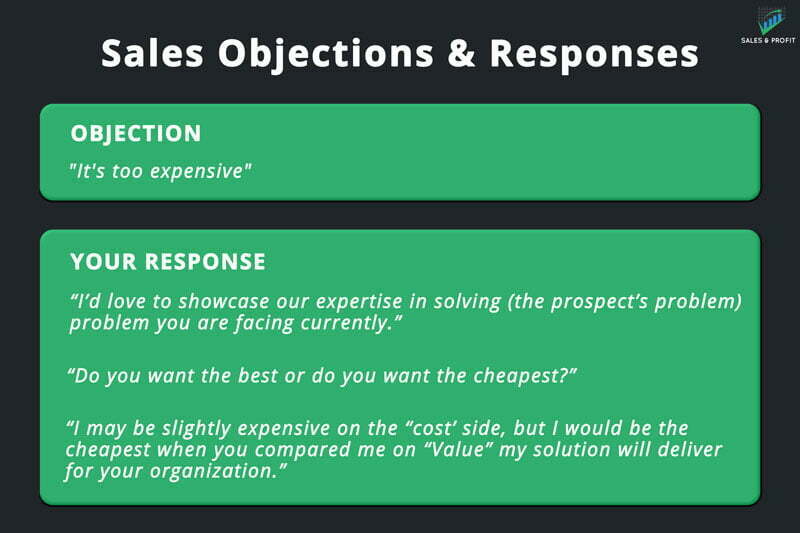
Why this objection arises?
As a salesperson, you’ll often hear from the prospect “Oh it’s too expensive, there are cheaper options out there.
According to Hubspot Research 35% of sales reps rank price objections as the most challenging
At its core, this objection often arises not just because of the actual price tag, but more so due to the perceived value.
When a prospect says it’s too expensive, what they might actually be saying is, “I don’t see the value in this for the price.”
They might be comparing your product or service with others in the market, or perhaps they haven’t fully grasped the unique benefits and differentiators of what you’re offering.
How to handle this objection?
To handle this objection, start by acknowledging their concern.
And from there emphasize on the value and benefits your product/service will provide to the customer’s problem/challenge.
Give examples of how it has helped other customers in similar spaces and show the ROI they can expect.
Do not focus on pricing as a selling point or you’ll end up selling your competitor to your prospect.
Instead, show the value they will receive.
This objection is easy to handle if your solution is truly exceptional and best in the space.
Rebuttal Examples
- “I’d love to showcase our expertise in solving (the prospect’s problem) problem you are facing currently.”
- “Do you want the best or do you want the cheapest?”
- “I may be slightly expensive on the “cost’ side, but I would be the cheapest when you compared me on “Value” my solution will deliver for your organization.”
2. "I don't have the budget."
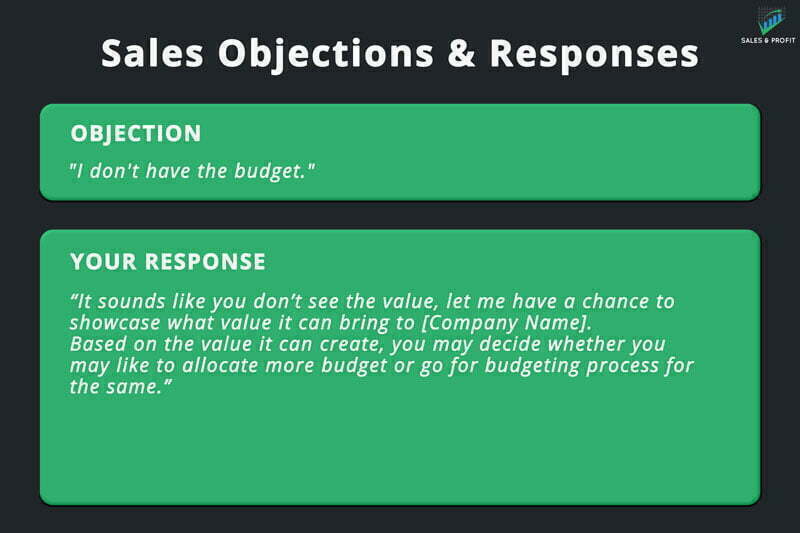
Why this objection arises?
If the prospect tells you they don’t have the budget, take the time to identify the root cause of their objection.
Because if the prospect is in a conversation with you, they might have a pressing problem.
But they haven’t allocated funds for a solution, maybe because they didn’t anticipate the need for it.
Sometimes, it’s not about the lack of funds but more about the allocation of those funds.
And, in some cases, it could be a tactic to negotiate a better deal.
How to handle this objection?
First & foremost, be clear that your prospect is fitting your ICP (Ideal Customer Profile).
You can’t sell your solution to everybody.
Assuming your prospect company is part of your ICP, you need to sell on the value your solution will bring and the potential ROI for their investment.
If the prospect doesn’t see the value, show them the pain points it can solve and show them the future state where the problem no longer exists.
You should also emphasize on the potential negative outcome if the challenge is not solved.
This way you can create urgency at the prospect’s end.
Rebuttal Examples
- “It sounds like you don’t see the value, let me have a chance to showcase what value it can bring to [Company Name]. Based on the value it can create, you may decide whether you may like to allocate more budget or go for budgeting process for the same.”
3. "We need to use that budget somewhere else."
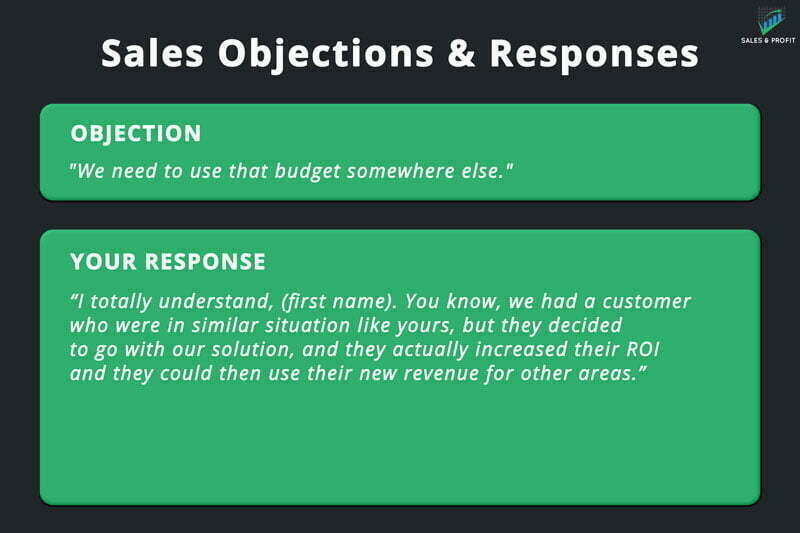
Why this objection arises?
This objection arises when the customer doesn’t see the value in your product or service or has competing priorities for their budget.
You see, every company has multiple needs, and they’re constantly juggling resources to address those needs.
This objection often surfaces when an unforeseen expense pops up, or maybe there’s a shift in company strategy that reallocates funds to a different project.
It’s also possible, that while they recognize the value in your offering, they don’t see a need for immediate implementation.
How to handle this objection?
Assuming you have access to the right decision influencers, you can then demonstrate the value of your product or service by showing how it has helped other companies in a similar space.
You can respond to this sales objection by showing them the case studies of similar companies that benefited from your solution and got a massive ROI. (if in case you don’t have access to key decision makers/influencers, you would waste your efforts/pitch to junior customer contacts).
Rebuttal Examples
- “I totally understand, (first name). You know, we had a customer who was in similar situation like yours, but they decided to go with our solution, and they actually increased their ROI and they could then use their new revenue for other areas.”
4. "I'm not interested."
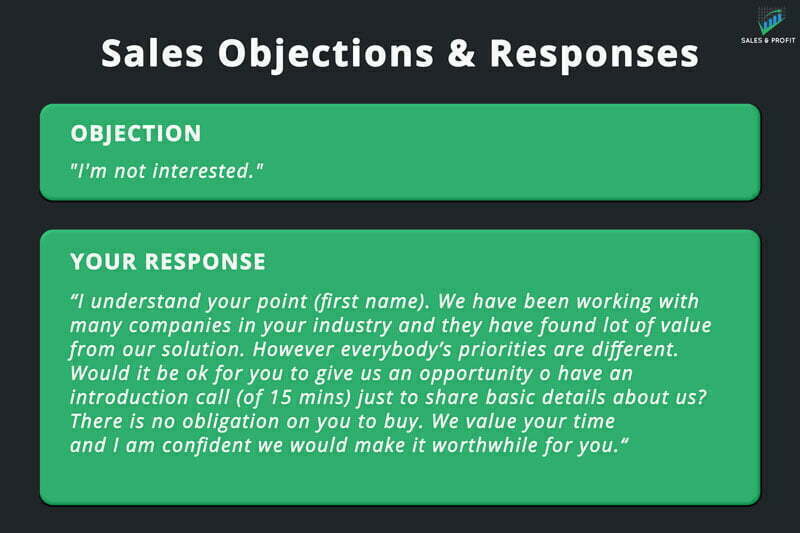
Why this objection arises?
It’s common for a prospect to say she is not interested in the initial cold calls.
It’s a bit of a broad statement, isn’t it?
When a prospect tells you they’re not interested, it’s important to understand why.
Maybe at this very moment, they don’t see the relevance of your offering to their current challenges or goals.
It’s also possible that they’re overwhelmed with other pitches and proposals, making it hard for them to discern the unique value of what you’re presenting.
And, sometimes it’s just about timing.
They might be preoccupied with other pressing matters, pushing your solution to the back burner.
How to handle this objection?
Here your elevator pitch usually makes or breaks the call.
Unless your pitch is compelling, crisp and customer-focused, the client may say the above objection.
Post a sharp pitch, ask questions to better understand their needs and explain how your product or service meets those needs.
While responding to this sales objection, focus on the benefits of your offering and how it can solve their problems.
Still, if they are not interested you can send over some resources and ask for a follow-up call.
Rebuttal Examples
- “I understand your point (first name). We have been working with many companies in your industry and they have found lot of value from our solution. However everybody’s priorities are different. Would it be ok for you to give us an opportunity to have an introduction call (of 15 mins) just to share basic details about us. There is no obligation on you to buy. We value your time and I am confident we would make it worthwhile for you.“
5. "I'm happy with my current provider."
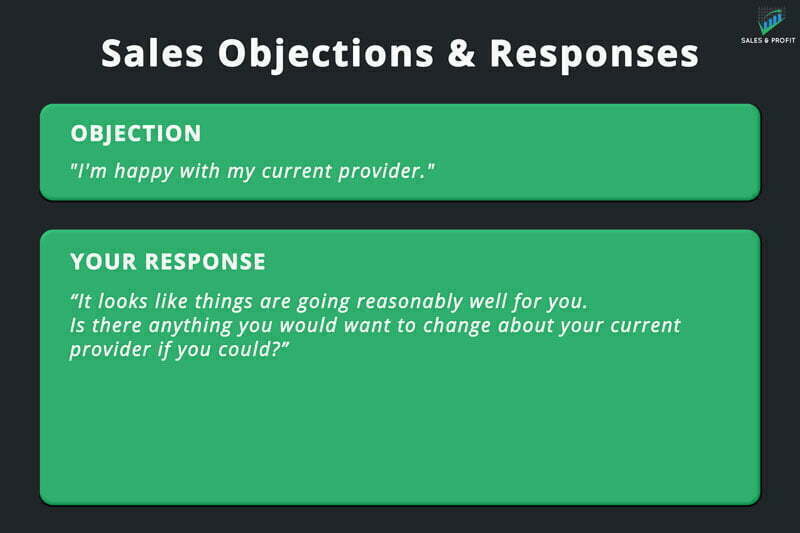
Why this objection arises?
This objection often arises when the prospect feels that the current solution, even if not perfect, is meeting their needs adequately.
Switching providers or solutions can be seen as a risk, involving time, effort, and sometimes money.
So, if they’re getting decent results and service from their current provider, they might be hesitant to rock the boat.
But, If you think about it, very few people love 100% of what they use.
There is always something they don’t like or something they’d like to improve.
That’s what you need to find.
How to handle this objection?
Ask questions to find out their current provider’s shortcomings, understand the importance of these shortcomings for your customer, and further try to quantify the leakage or opportunity cost.
And when the time is appropriate in the call, show them how your product can do it better and subtly show the ROI. (BTW you also need to be aware of migration costs/hassles for your customer).
Rebuttal Examples
- “It looks like things are going reasonably well for you. Is there anything you would want to change about your current provider if you could?”
6. "I need more time to think."
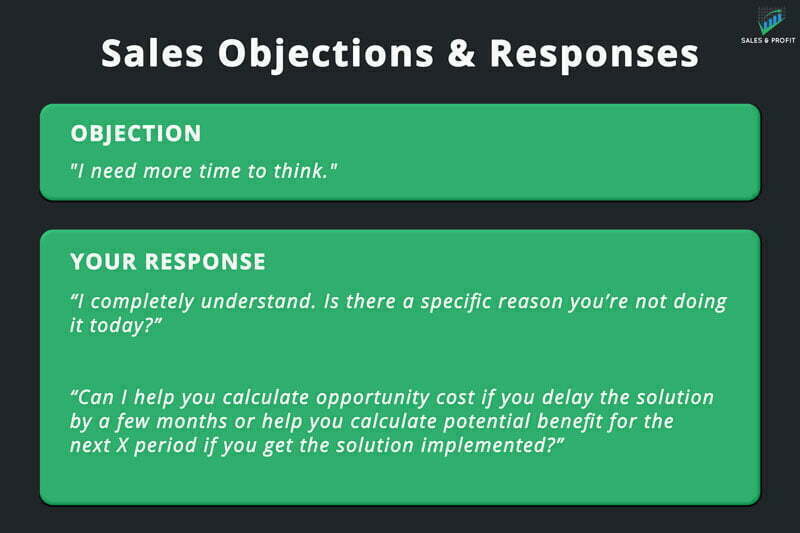
Why this objection arises?
When a prospect says “I need more time to think” as a sales objection, it’s an indication that they are not yet ready to decide today.
There can be various reasons behind this no decision.
Might be they’re weighing the pros and cons, trying to envision how your solution fits into their current processes or setup.
It’s also possible that they’re discussing internally with other stakeholders or team members, seeking consensus before moving forward.
Sometimes it’s about digesting all the information presented to them, ensuring they’ve grasped every detail.
And, well, in some cases, they might be comparing your offering with competitors, trying to discern which one aligns best with their needs.
How to handle this objection?
As a salesperson, you need to find out the exact reason behind this objection, so that you can further provide a solution to that reason.
As mentioned in the “I don’t have the budget”, it’s about how you can create urgency at prospect’s end for a fast decision.
Rebuttal Examples
- “I completely understand. Is there a specific reason you’re not doing it today?”
- “Can I help you calculate opportunity cost if you delay the solution by a few months or help you calculate potential benefit for the next X period if you get the solution implemented?”
7. "I had a bad experience with a similar solution in the past."
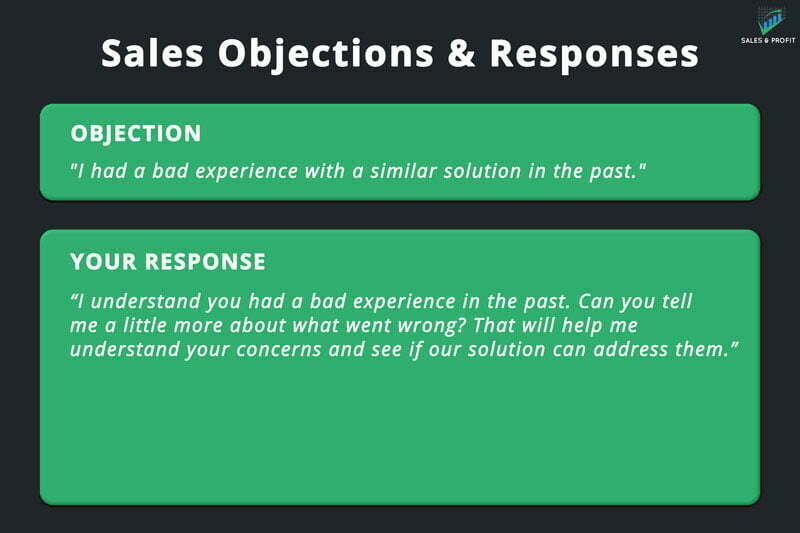
Why this objection arises?
When a prospect brings this up, it’s often rooted in past disappointments or unmet expectations.
They might’ve invested time, money, and resources into a solution that promised the world but fell short.
This past experience can leave them skeptical, and wary of making the same mistake again.
It’s not just the financial aspect; it’s also the emotional toll of feeling let down.
And, there’s also the potential damage to their credibility within their organization.
How to handle this objection?
This one is pretty straightforward to handle.
First, understand what actually didn’t work for them by asking questions.
And showcase to them why your solution is different, and they wouldn’t face any of those issues.
Rebuttal Examples
- “I understand you had a bad experience in the past. Can you tell me a little more about what went wrong? That will help me understand your concerns and see if our solution can address them.”
8. "We’re already doing this in-house."
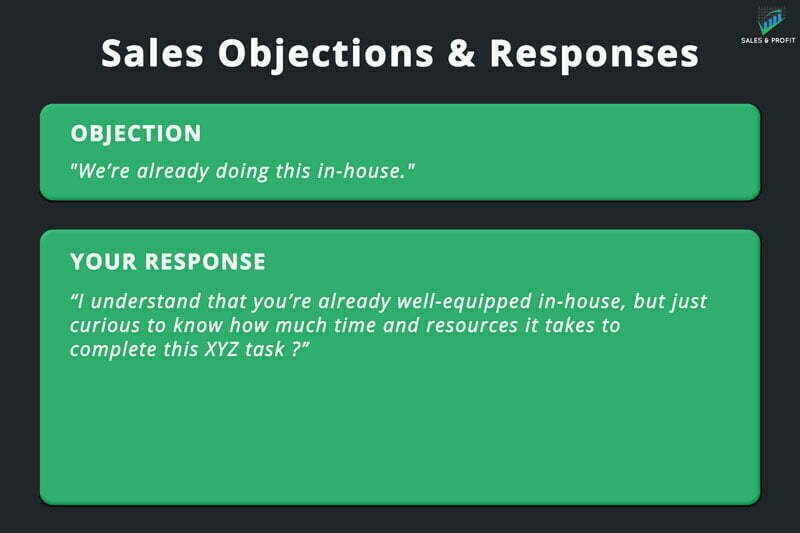
Why this objection arises?
This objection is a difficult one to handle because it suggests that the prospect is already handling the task on their own and may not see the value in outsourcing it.
Many organizations believe in leveraging their in-house talent and resources to, you know, maintain control, ensure alignment with their company culture, or simply save costs.
This objection often arises from a place of pride in their team’s skills and a desire to maximize the use of existing resources.
It could also be a result of past experiences where external solutions didn’t quite mesh with their internal processes or company values.
And, well, there’s also the aspect of perceived cost savings, thinking that keeping things in-house might be more economical in the long run.
How to handle this objection?
You need to understand their scope of work and if you have a solution that can do better then what they’re doing in-house.
If yes, you can start asking questions to determine how much time it takes them to complete the task and how many resources need to be involved.
Then highlight how your solution can help them do that task faster or/& better or/& cheaper &/or bring convenience etc.
Rebuttal Examples
- “I understand that you’re already well-equipped in-house, but just curious to know how much time and resources it takes to complete this XYZ task ?”
9. "I’m not responsible to make these decisions."
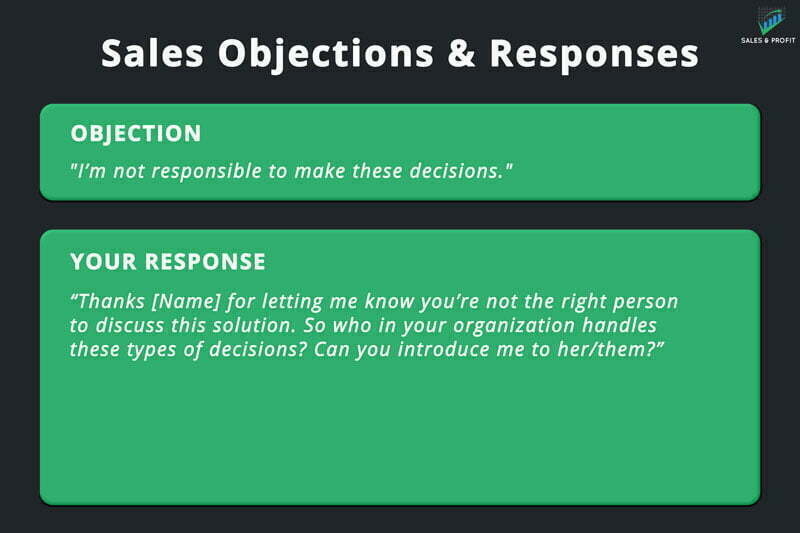
Why this objection arises?
Here your prospect is trying to convey that she is not the right person to have this conversation.
These kinds of objections are common in the early sales cycle.
It’s often rooted in the intricate dynamics of organizational roles and responsibilities.
Many times, individuals are part of a larger matrix where decision-making powers are reserved for specific roles or tiers.
This statement can be a genuine reflection of their position within that matrix.
But on the flip side, it could also be a subtle way for the individual to sidestep the conversation, especially if they’re feeling a bit unsure or overwhelmed.
How to handle this objection?
The best way to handle this objection is to directly ask the prospect who is the right person to talk with.
And whether she can help you connect with the decision-maker.
Rebuttal Examples
- “Thanks [Name] for letting me know you’re not the right person to discuss this solution. So who in your organization handles these types of decisions? Can you introduce me to her/them?”
10. "I've never heard of your company."
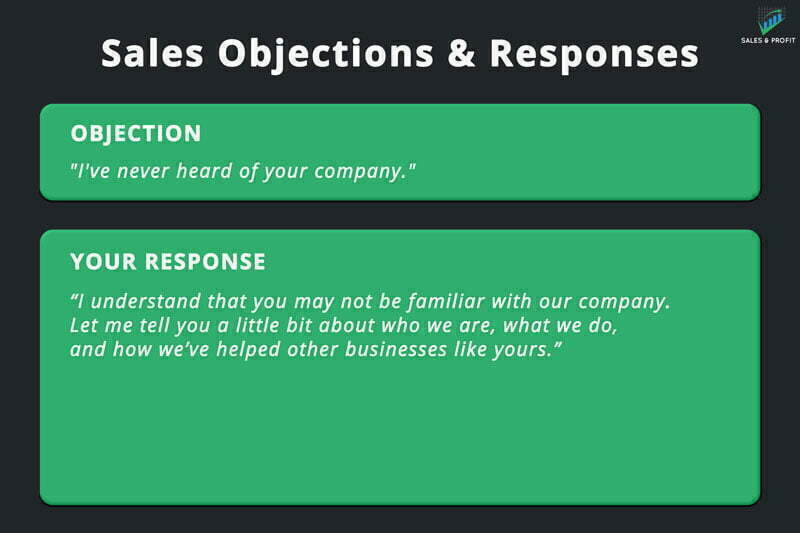
Why this objection arises?
Usually, startup companies face these objections.
Don’t take it as an offence.
With so many players in the field, it’s quite common for potential clients to be unfamiliar with every single brand, especially if they’re newer or operate in a niche segment.
On another note, this objection might also subtly hint at a trust issue.
It’s like the individual is saying, “How do I know you’re credible if I’ve never come across your name before?”
So, when you hear this introducing your company would not be enough.
How to handle this objection?
When a customer has never heard of your company, it’s important to establish credibility and build trust.
Provide information about your company’s history and track record of success, as well as customer testimonials and social proof.
Rebuttal Examples
- “I understand that you may not be familiar with our company. Let me tell you a little bit about who we are, what we do, and how we’ve helped other businesses like yours.”
11. "I'm busy right now."
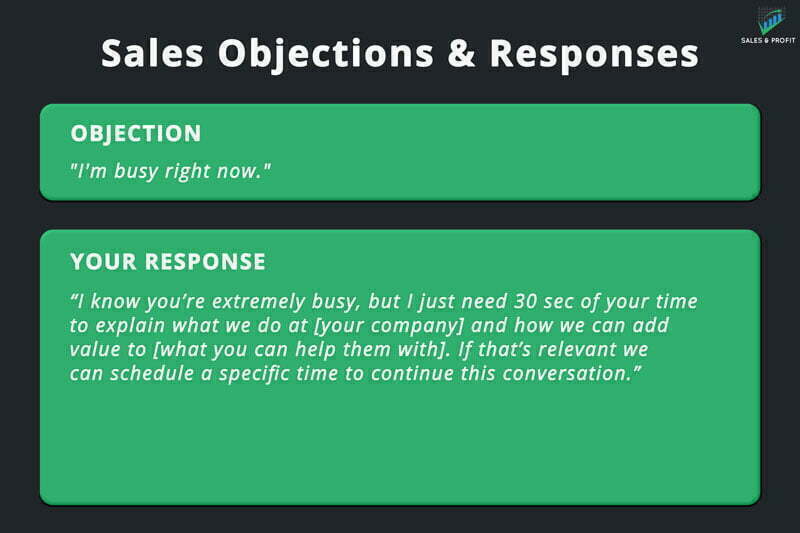
Why this objection arises?
A salesperson hears this statement very often, especially if you’re cold-calling the prospect.
You need to understand that everyone is busy, but if they have picked up your phone so they can at least give you 30 seconds. (rather if they are genuinely stuck in something important).
It could be that they’re not in the right headspace to discuss or they might be dealing with more pressing matters.
There’s also a chance that they’re not entirely convinced about the value of the conversation.
How to handle this objection?
There can be 2 scenarios here – Either they are not interested in your solution,
Or they might be interested but not ready to have a long conversation right now.
In either scenario, you need to acknowledge that you understand she is busy and then mention that you just want to have a quick chat.
Rebuttal Examples
- “I know you’re extremely busy, but I just need 30 sec of your time to explain what we do at [your company] and how we can add value to [what you can help them with]. If that’s relevant we can schedule a specific time to continue this conversation.”
12. "Send me an Email."
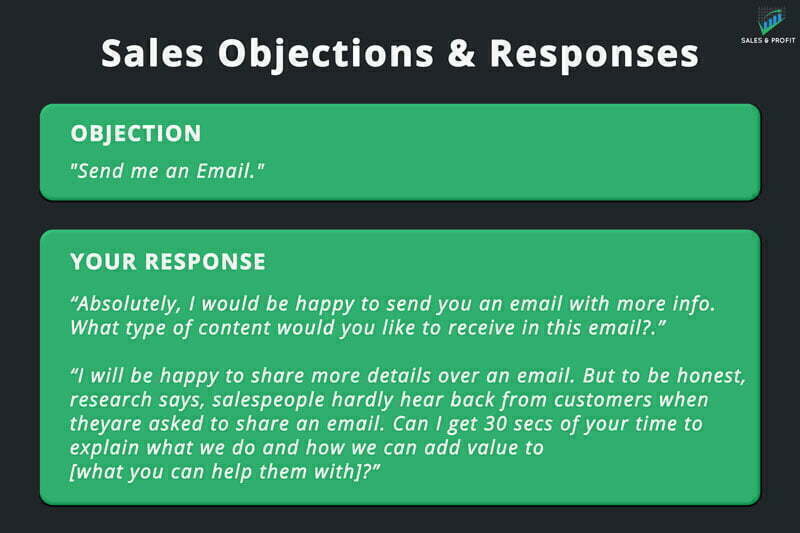
Why this objection arises?
Usually, an average salesperson will get excited when a prospect says “Please send me an email”, but most likely customers are not going to respond.
This objection is a polite way of saying that “I’m not interested to discuss further”.
Maybe they’re not seeing the immediate value, or perhaps they’re just too occupied at the moment.
It’s also a way for them to control the conversation, and to decide when and how to respond.
How to handle this objection?
The best way to handle this objection is to ask questions about what content they would like to see in the email.
Post that ask for a time slot to schedule a follow-up call.
Rebuttal Examples
- “Absolutely, I would be happy to send you an email with more information. What type of content would you like to receive in this email?.”
- “I will be happy to share more details over an email. But to be honest, research says, salespeople hardly hear back from customers when they are asked to share an email. Can I get 30 secs of your time to explain what we do and how we can add value to [what you can help them with]?”
13. "It’s not a priority right now."
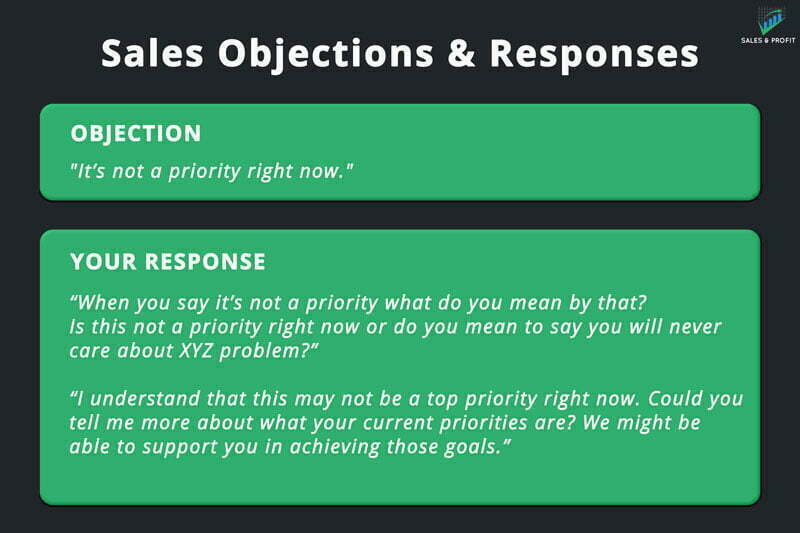
Why this objection arises?
A prospect will use this objection as a simple brush-off if they are not interested in your product/ service.
Maybe they’re dealing with internal changes, or perhaps they’re channelling resources into another project.
It’s also possible that they don’t fully grasp the urgency or the potential impact of your solution.
It’s like when you have multiple tasks on your plate, and you need to decide which one to tackle first.
It doesn’t mean the other tasks aren’t important.
It’s not their priority right now.
How to handle this objection?
The best way to handle this objection is to understand if it’s not a priority right now or ever in the future.
And if it’s not a priority, then what are their priorities?
That way you can show how your solution can fit into their current priorities.
Rebuttal Examples
- “When you say it’s not a priority what do you mean by that? Is this not a priority right now or do you mean to say you will never care about XYZ problem?”
- “I understand that this may not be a top priority right now. Could you tell me more about what your current priorities are? We might be able to support you in achieving those goals.”
14. "We’re already working with company X."
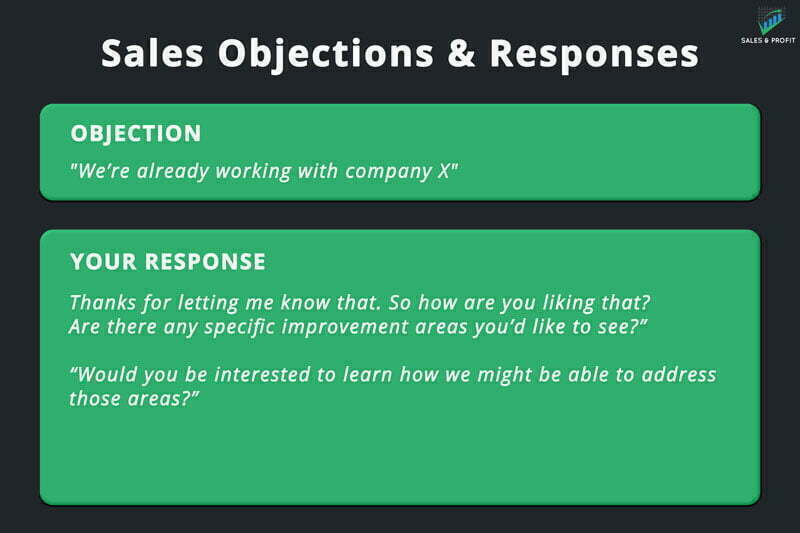
Why this objection arises?
To hear the prospect is already working with your competitor company can be upsetting.
Businesses usually tend to stick with what’s familiar.
They’ve built a relationship, established trust, and there’s a certain level of ease in continuing with what they know.
But here’s the thing, just because they’re working with another company doesn’t mean they’re getting the best solution or the most value.
Maybe they haven’t explored other options, or perhaps they’re unaware of the advancements in the market.
But the positive side of it is, the prospect already has the need for that solution and you don’t need to educate them on why they need to consider this solution.
How to handle this objection?
So you need to start by acknowledging the scenario, and then ask what are the things they’d like to improve in the current vendor.
They’ll most likely share the improvement areas and now you can position your solution to address those gaps.
Rebuttal Examples
- “Thanks for letting me know that. So how are you liking that? Are there any specific improvement areas you’d like to see?”
- “Would you be interested to learn how we might be able to address those areas?”
15. "I don't want to get tied in a long-term contract."
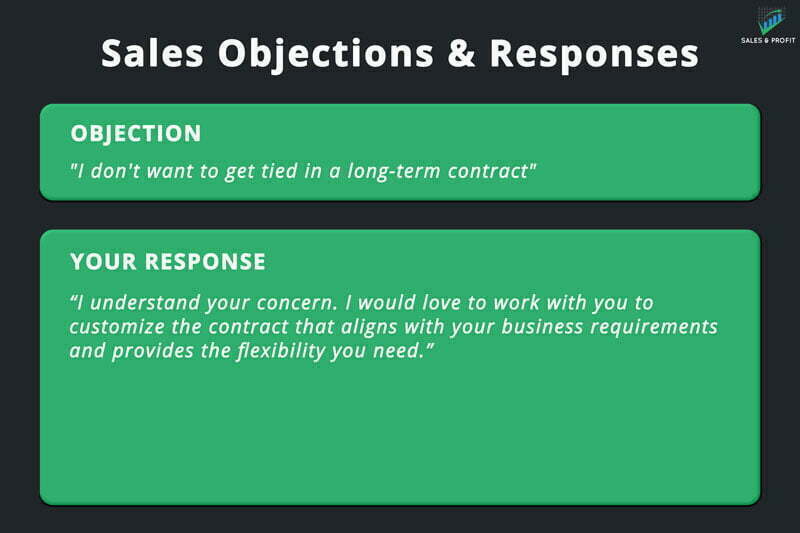
Why this objection arises?
The reason your client raised this objection is that they may be concerned about being stuck in a contract that they can’t modify or change easily as per their business needs.
They’re thinking about flexibility, about not being shackled down.
Maybe they’ve been burned before, locked into something that didn’t pan out as they’d hoped.
Or perhaps they’re just cautious by nature, always wanting an exit strategy.
How to handle this objection?
To handle this objection you simply need to neutralize their concerns by highlighting the benefits and flexibility of your contract terms, such as cancellation policies, upgrade or downgrade options, and contractual adjustments based on their evolving needs.
It’s about assuring them that while a contract is a commitment, it’s not a trap.
Rebuttal Examples
- “I understand your concern. I would love to work with you to customize the contract that aligns with your business requirements and provides the flexibility you need.”
16. "I’m not seeing potential ROI."
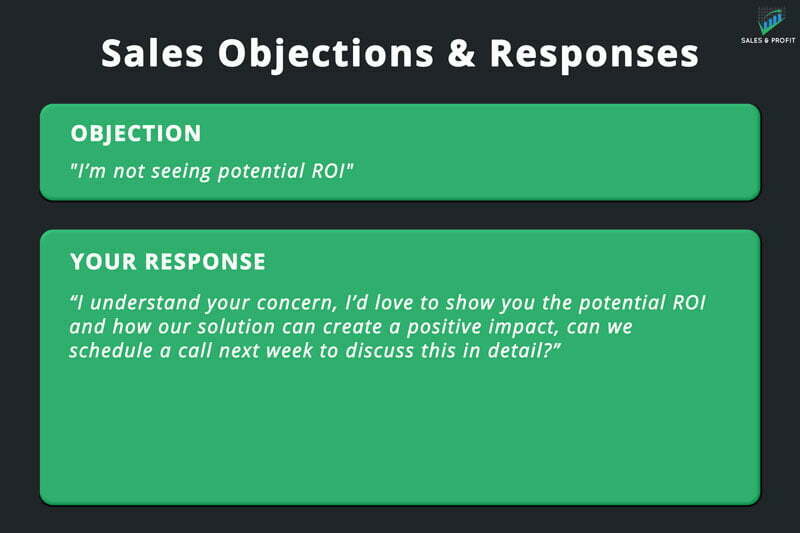
Why this objection arises?
At times the prospect may not see that investing in your product or service will result in a positive return on investment.
It’s not just about money; it’s about value, about ensuring that what goes as an investment will yield positive returns.
And sometimes, it can be hard to visualize that for the prospect on their own.
How to handle this objection?
To turn their doubt into confidence show the actual ROI in “NUMBERS” and lead it with actual case studies of past clients.
Hard statistics will break through here.
Remember don’t sell the benefits/ features, “sell the outcome”.
Rebuttal Examples
- “I understand your concern, I’d love to show you the potential ROI and how our solution can create a positive impact, can we schedule a call next week to discuss this in detail?”
17. "Your product/ service doesn't have X features we need."
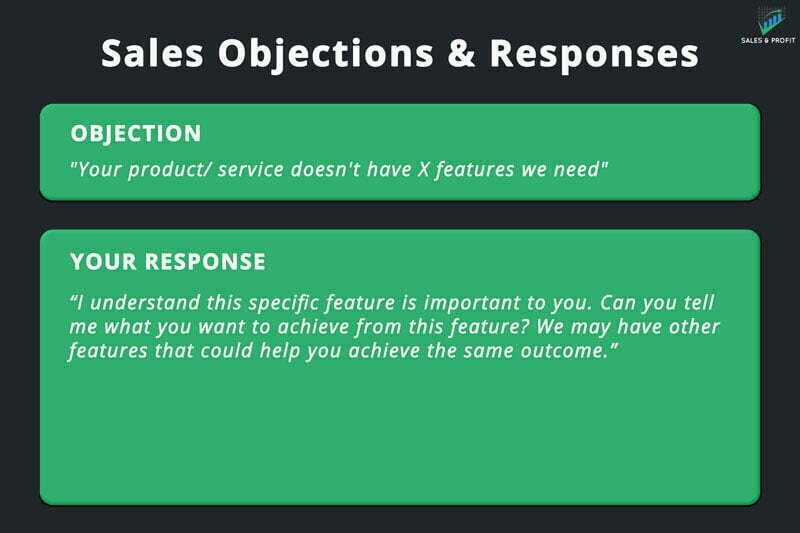
Why this objection arises?
There could be 2 scenarios here – You don’t have the feature the prospect genuinely wants.
In this case, better to disqualify the prospect fast.
In the second scenario, the prospect feels they need that feature but in reality, they just need to perform a certain task/ function that your solution can do.
In this case, you can definitely sell.
How to handle this objection?
In the first scenario, instead of beating around the bush, you can upfront accept that your solution may not be the perfect fit for them.
Though you will lose the sale now, you will definitely gain more trust and respect from the customer.
In the second scenario, you need to ask questions to further understand what they want to achieve from the feature they want.
Uncover the end outcome they want and show them your solution can help them achieve that.
Rebuttal Examples
- “I understand this specific feature is important to you. Can you tell me what you want to achieve from this feature? We may have other features that could help you achieve the same outcome.”
18. "We're waiting for budget approval from upper management."
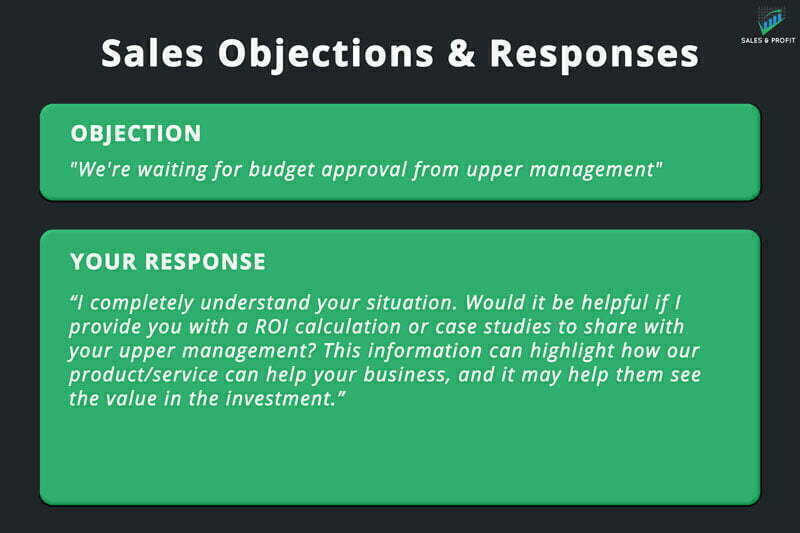
Why this objection arises?
“When a prospect mentions, “We’re waiting for budget approval from upper management,” it’s a clear signal of the hierarchical decision-making process within their organization
This objection arises when the prospect may not have the authority to make purchasing decisions or allocate budget without approval from higher-ups in their organization.
That doesn’t mean you’re talking to the wrong person.
In many organizations, especially larger ones, budget approvals can be a meticulous process, requiring multiple stages of validation.
The prospect might genuinely see the value in your offering but needs to convince those holding the purse strings.
How to handle this objection?
Here you need to keep the prospect you are speaking with by your side.
If the prospect feels your solution can create a positive impact in their organization, you need to help her sell your solution internally to speed up the approval process.
Here you need to clearly show the ROI of your solution.
Rebuttal Examples
- “I completely understand your situation. Would it be helpful if I provide you with a ROI calculation or case studies to share with your upper management? This information can highlight how our product/service can help your business, and it may help them see the value in the investment.”
19. "How did you get my information?"
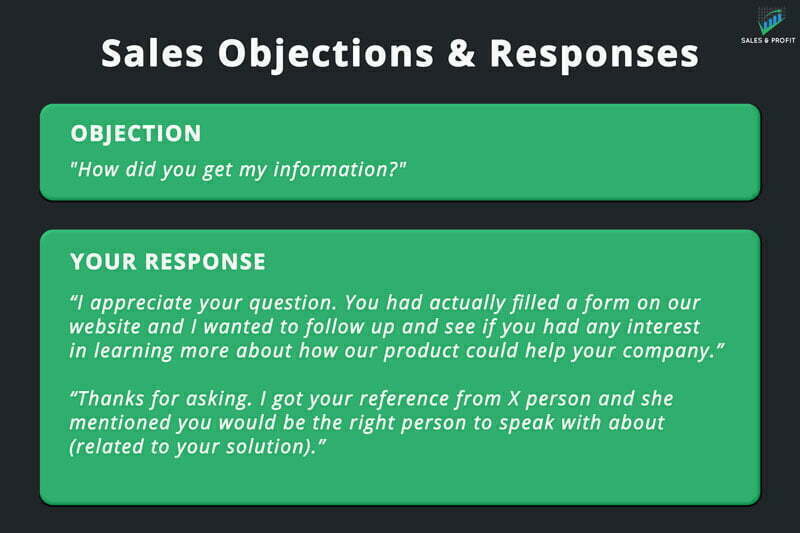
Why this objection arises?
When a prospect inquires this, it’s a manifestation of the modern-day concerns surrounding data privacy and security
If you haven’t acquired the prospect’s information from a paid database, you are pretty much good to go (If you have, your prospect has the right to be annoyed)
It’s natural for prospects to be protective of their privacy and question how you obtained their information.
How to handle this objection?
Don’t get defensive or secretive.
Instead, be transparent and honest about how you obtained their information.
Simply remind them that they may have filled out a form on your website, signed up for any of your events (webinars, workshops, tradeshows etc), or got it as a reference from someone in their company or yours.
Or you can just say that you got it from the marketing department of your company.
Rebuttal Examples
- “I appreciate your question. You had actually filled a form on our website and I wanted to follow up and see if you had any interest in learning more about how our product could help your company.”
- “Thanks for asking. I got your reference from X person and she mentioned you would be the right person to speak with about (related to your solution).”
20. "I don't think your product/service solves our challenges."
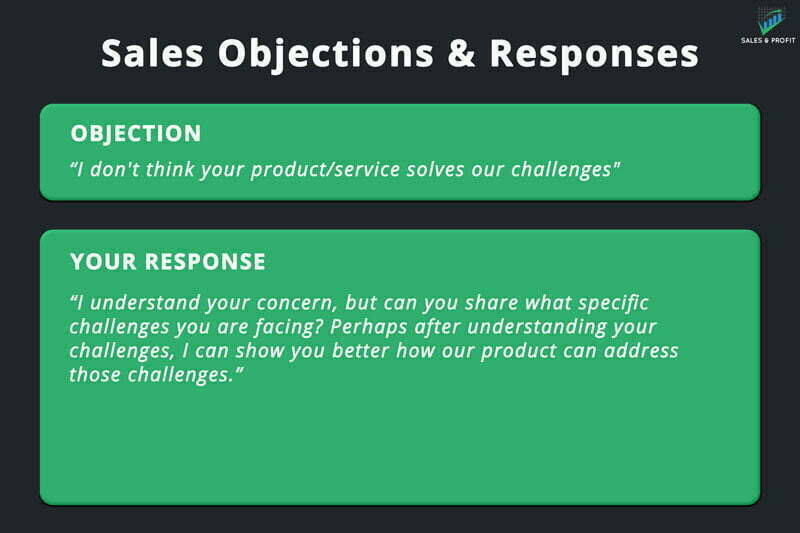
Why this objection arises?
This objection can be a real red flag for you.
The reason this objection arises is because they feel that their unique challenges and pain points are not being addressed by your solution.
It’s often a reflection of a perceived gap between their unique needs and the solutions you’re offering.
It’s also possible that the initial communication didn’t effectively highlight how your product or service addresses their specific pain points.
This could be because you haven’t done enough research into their specific needs, or you don’t have enough information about what the customer actually wants.
This objection underscores the importance of deeply understanding a prospect’s challenges and ensuring that the solutions presented are tailored to their unique circumstances.
How to handle this objection?
Trace back your steps and start by asking the prospect what challenges they are facing.
Once you have enough information, then go ahead and show how your product will solve those challenges.
Rebuttal Examples
- “I understand your concern, but can you share what specific challenges you are facing? Perhaps after understanding your challenges, I can show you better how our product can address those challenges.“
21. "We're in the midst of downsizing / merger / bought out."
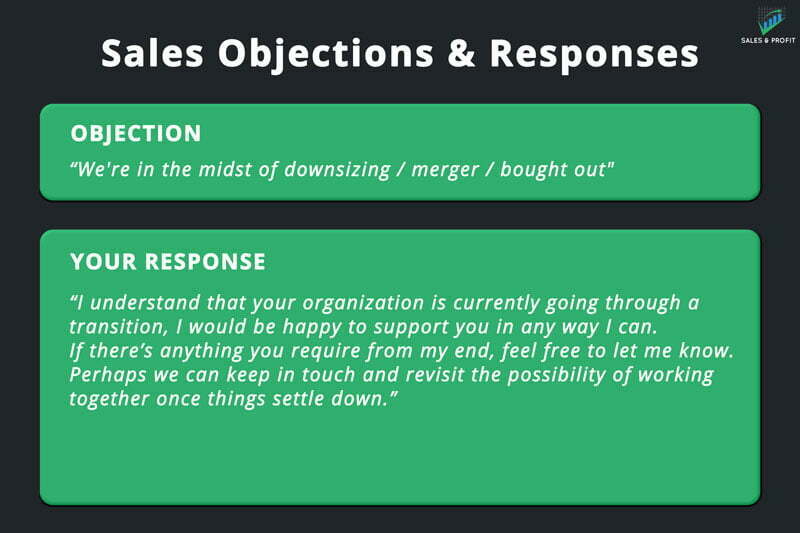
Why this objection arises?
Situations like these may cause disruptions in their operations and decision-making processes.
Such transitions can be tumultuous, often leading to shifts in priorities, budgets, and decision-making processes.
The objection arises because, during these times, companies are typically focused on internal restructuring, managing employee morale, and ensuring business continuity.
Introducing a new product or service might be perceived as an additional complexity they’re not ready to handle at the moment
The prospect may not have the authority or bandwidth to make purchasing decisions at the moment.
How to handle this objection?
Be empathetic and understanding towards their situation.
Acknowledge that this is a challenging time for them and their organization
Ask them how you can best support them during this period, whether that’s by providing information or resources that may be helpful.
And close the call by asking them to stay in touch.
Rebuttal Examples
- “I understand that your organization is currently going through a transition, I would be happy to support you in any way I can. If there’s anything you require from my end, feel free to let me know. Perhaps we can keep in touch and revisit the possibility of working together once things settle down.“
22. "I’ve seen bad reviews about your company."
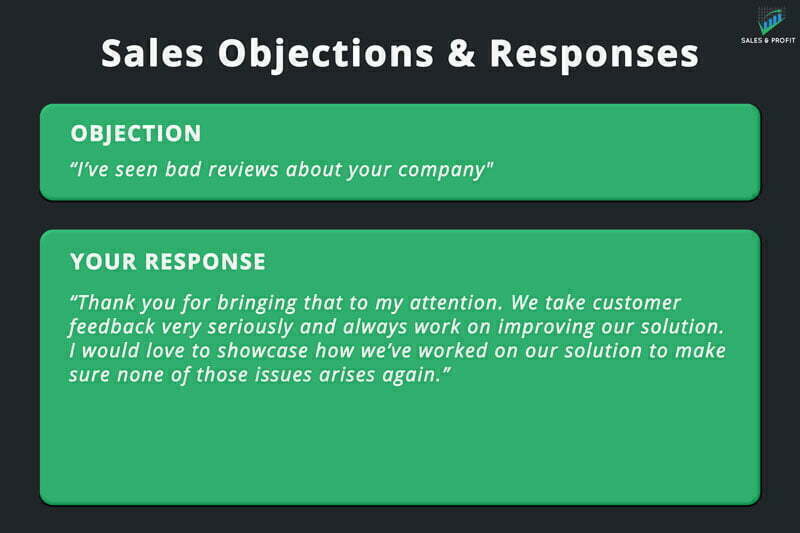
Why this objection arises?
The objection of seeing bad reviews about your company can be a challenging one to handle.
This objection arises because today’s consumers are more informed and diligent in their research than ever before.
They rely heavily on reviews and testimonials to gauge the credibility and effectiveness of a product or service.
How to handle this objection?
Rather than getting defensive or dismissive, acknowledge the feedback and thank the prospect for sharing it with you.
This will indicate that you take customer feedback seriously and are committed to improving.
Then further show what changes your company made to ensure that future customers won’t face any such issues.
Share the positive reviews and case studies of other customers to build back trust and credibility.
Rebuttal Examples
- “Thank you for bringing that to my attention. We take customer feedback very seriously and always work on improving our solution. I would love to showcase how we’ve worked on our solution to make sure none of those issues arises again.“
23. "We don't have the resources or expertise to implement your solution."
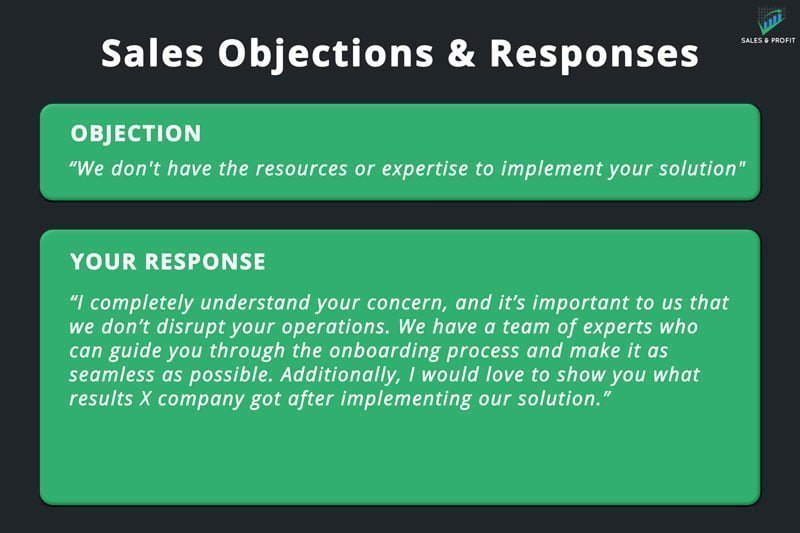
Why this objection arises?
When a prospect expresses concern about not having the resources or expertise to implement your solution, it can be a serious roadblock to closing the deal.
This objection is a genuine reflection of their internal constraints and apprehensions.
It often arises from past experiences where they might have invested in a solution, only to find that they lacked the manpower, technical know-how, or both, to effectively integrate it into their operations.
It’s also possible that they’re currently stretched thin, with their teams already juggling multiple responsibilities.
They fear the added burden of navigating a new system or process, especially if it requires specialized skills they don’t possess.
How to handle this objection?
You need to clarify the implementation process, explain where you would help them, and how quickly they can see the results.
Here you need to be specific and avoid exaggerating or lying.
If necessary show how other customers felt the same, but the results they got after using our solution.
Rebuttal Examples
- “I completely understand your concern, and it’s important to us that we don’t disrupt your operations. We have a team of experts who can guide you through the onboarding process and make it as seamless as possible. Additionally, I would love to show you what results X company got after implementing our solution.“
24. "I need to check with my team first."
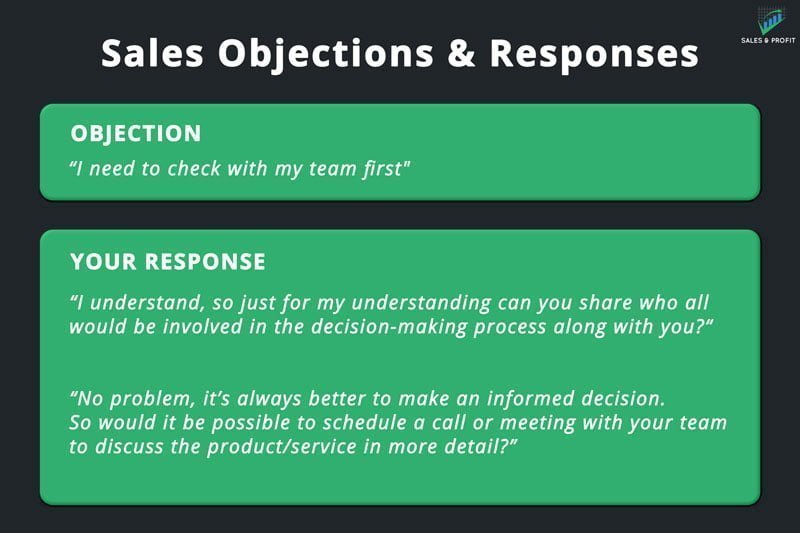
Why this objection arises?
In a sales process, there could be various decision-makers involved.
And that’s why this objection would arise.
It’s a clear indication of the collaborative decision-making culture within their organization.
This objection often stems from a place of responsibility and prudence. The individual you’re speaking to might not be the sole decision-maker, and she may want to involve other team members to review your solution.
This could also be a way for them to delay making a decision or to avoid saying no directly.
How to handle this objection?
First, you need to try finding out who the decision-makers are and what their roles are in the buying process.
This will help you modify your pitch according to the decision maker’s KRA.
Ask the prospect who is involved in the decision-making process and what their roles are.
If the prospect is not opening up with their details, offer to set up a meeting or call with her team to present your product/ service.
Rebuttal Examples
- “I understand, so just for my understanding can you share who all would be involved in the decision-making process along with you?“
- “No problem, it’s always better to make an informed decision. So would it be possible to schedule a call or meeting with your team to discuss the product/service in more detail?”
25. "As a policy we don’t work with new vendors."
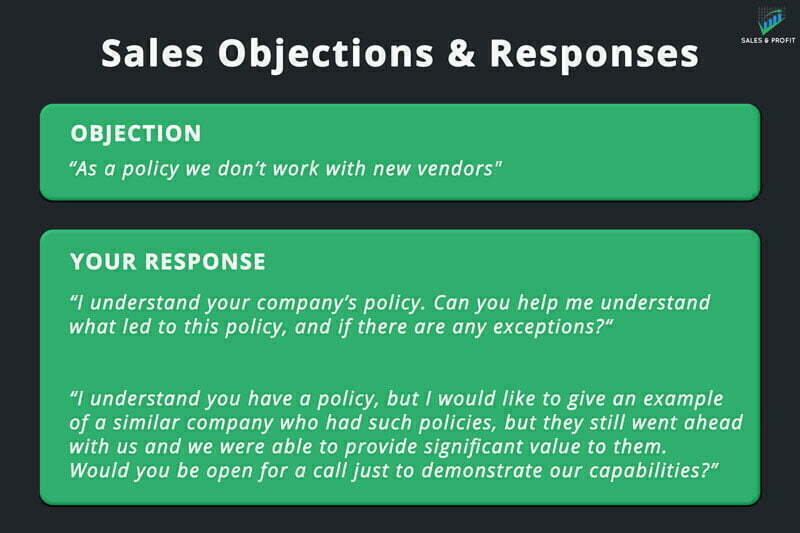
Why this objection arises?
There can be a few reasons for this objection.
The company may have strict policies about vendor selection, or they had a negative experience in the past with a new vendor.
They may also have established relationships with their current vendors and be hesitant to add a new one.
Such policies are typically in place to mitigate risks associated with unknown companies.
It underscores the company’s emphasis on stability and reliability.
How to handle this objection?
You need to go in-depth to find the reason for this policy.
As mentioned above there can be multiple reasons for implementing this policy.
Also, show them examples of other customers who had the same policy, but they went ahead with your solution and saw X benefit.
Rebuttal Examples
- “I understand your company’s policy. Can you help me understand what led to this policy, and if there are any exceptions?“
- “I understand you have a policy, but I would like to give an example of a similar company who had such policies, but they still went ahead with us and we were able to provide significant value to them. Would you be open for a call just to demonstrate our capabilities?”
26. "I don't have time for a demo/presentation."
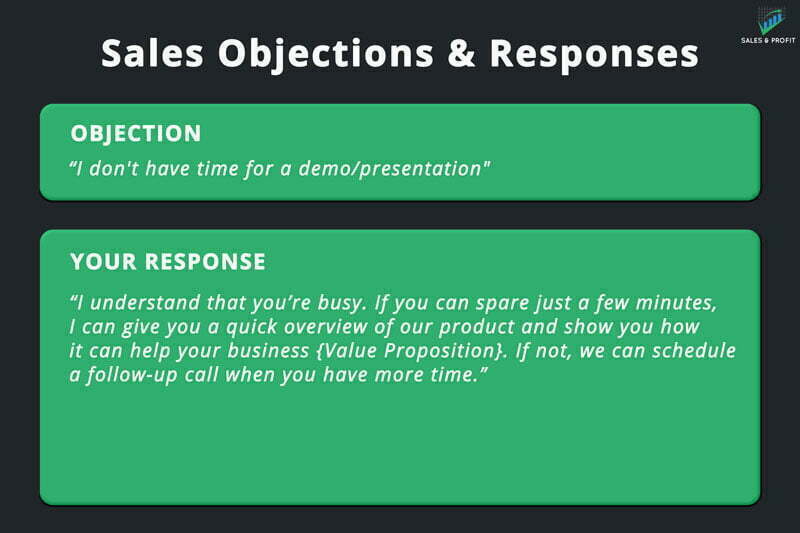
Why this objection arises?
This is again a common one salesperson hears.
But it doesn’t necessarily mean the prospect is not interested in your product or service.
It could be that they are too busy at the moment or don’t see the value in spending time on a demo.
But you need to give it a try.
How to handle this objection?
It’s important to listen to the prospect and acknowledge their busy schedule.
Here again, an effective elevator pitch would make a difference.
Offer a quick and concise pitch that will pique their interest.
Then close it by asking for a better time to schedule a follow-up meeting when they might have more availability.
Rebuttal Examples
- “I understand that you’re busy. If you can spare just a few minutes, I can give you a quick overview of our product and show you how it can help your business {Value Proposition}. If not, we can schedule a follow-up call when you have more time.“
27. "We’re not ok with the pricing model."
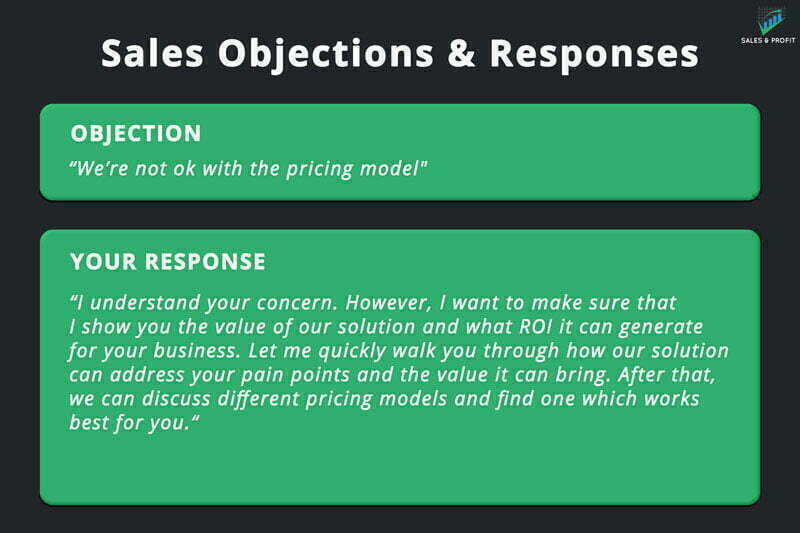
Why this objection arises?
This objection is similar to “You’re expensive” ones.
It often stems from a deeper concern about the perceived value versus the investment required.
They perceive that the price of your solution is too high or does not fit their budget.
It’s also possible that they don’t fully grasp the value your solution brings, making the price seem disproportionate.
How to handle this objection?
Ask the prospect what the exact concerns about the pricing model are.
Further, communicate the value proposition of your solution clearly and emphasize the benefits that the prospect will receive in return.
Don’t go into negotiating or offering discounts right away.
Rebuttal Examples
- “I understand your concern. However, I want to make sure that I show you the value of our solution and what ROI it can generate for your business. Let me quickly walk you through how our solution can address your pain points and the value it can bring. After that, we can discuss different pricing models and find one which works best for you.“
28. "Our priorities have changed."
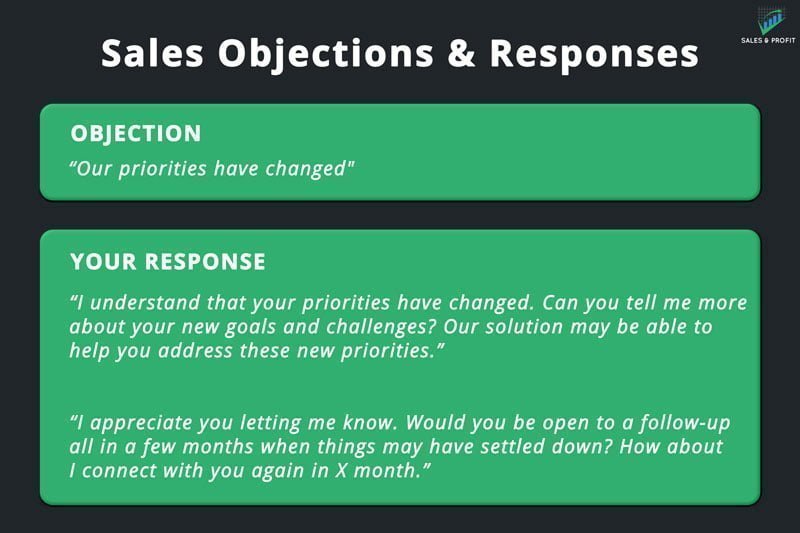
Why this objection arises?
When a prospect throws this objection, it could mean a variety of things.
Such a statement often arises when there’s been a shift in the company’s strategy, perhaps due to market changes, internal restructuring, or a response to unforeseen challenges.
It could also indicate a change in leadership or a reallocation of resources to address more pressing issues.
How to handle this objection?
The first thing you need to do when a customer says their priorities have changed is to try to understand why.
Ask questions that could help you get to the bottom of their new priorities.
If the prospect is still a good fit for your solution, try to reframe the conversation to show how your solution can help them address their new priorities.
Focus on the benefits of your solution and how it can solve their current problems.
Even if the prospect is not interested right now, it’s important to stay in touch and nurture the relationship.
Once the need arises again, they know whom to reach out.
Rebuttal Examples
- “I understand that your priorities have changed. Can you tell me more about your new goals and challenges? Our solution may be able to help you address these new priorities.”
- “I appreciate you letting me know. Would you be open to a follow-up call in a few months when things may have settled down? How about I connect with you again in X month.”
29. "I need to do some research."
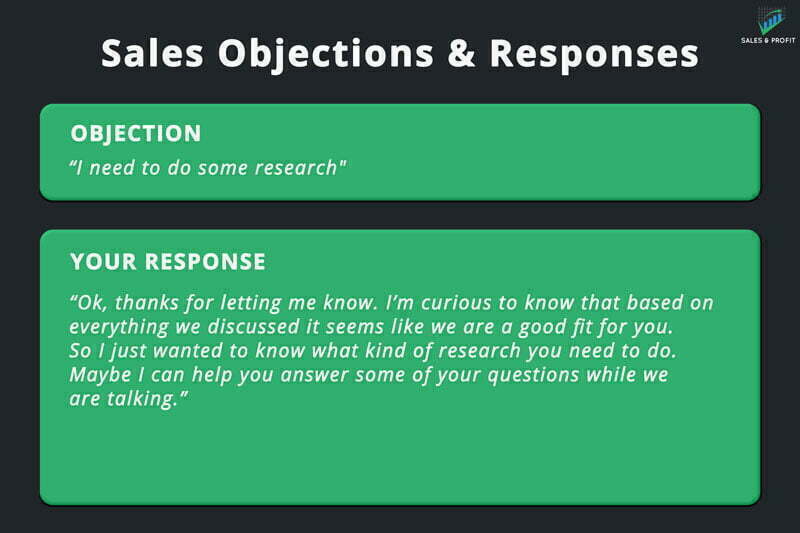
Why this objection arises?
When a prospect says this, it’s very unclear what research they need to do.
In today’s digital age, information is at everyone’s fingertips, and it’s only natural for individuals to seek out as much knowledge as possible before committing.
This objection can also hint at some underlying skepticism.
Or it can also be just a brush-off and there could be some another reason as to why they are not buying which they don’t want to share.
How to handle this objection?
So you need to know exactly what research they want to do, or if there is any research whatsoever.
The best is to ask directly what kind of research they want to do.
Position yourself as the authority and expert and offer them help in their research.
Either they will tell you what research they want to do like – competitor comparison, reviewing your case studies etc.
So now you know the exact reason for this objection, and you can steer the conversation in that direction.
Rebuttal Examples
- “Ok, thanks for letting me know. I’m curious to know that based on everything we discussed it seems like we are a good fit for you. So I just wanted to know what kind of research you need to do. Maybe I can help you answer some of your questions while we are talking.”
30. "We're not ready to buy right now."
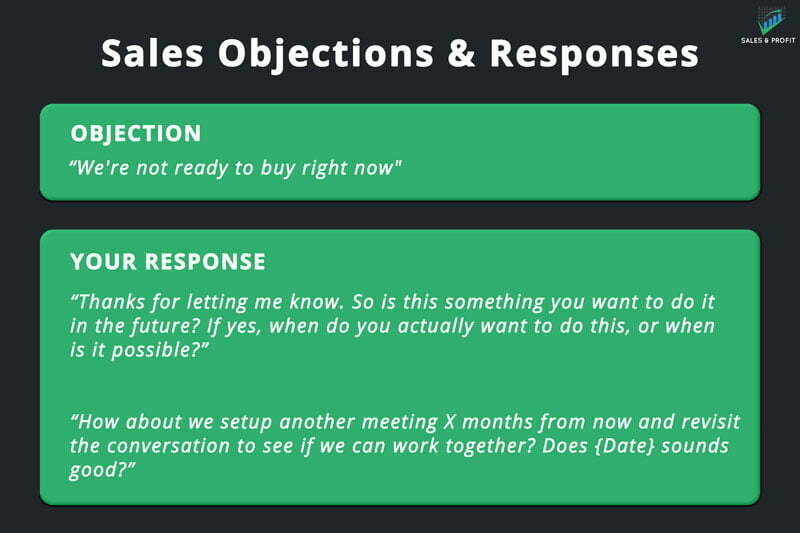
Why this objection arises?
This objection is more about the right timing.
It often reflects a myriad of underlying reasons.
Perhaps they’re in the initial stages of their buying journey, merely gathering information for a future decision.
It could also indicate budgetary constraints, where they’re waiting for the next financial cycle to allocate funds.
Sometimes, it’s about internal dynamics – maybe they’re undergoing organizational changes, or there are other pressing priorities taking precedence.
How to handle this objection?
So here your goal is to first confirm if they are going to be ready in the future or if they even want to do this.
If it’s in their plans in the future, ask them exactly when you can connect back with them.
And send a calendar invite right away.
That’s how you make sure that when you call them in the future, it’s not a cold call but it’s already in their calendar.
Rebuttal Examples
- “Thanks for letting me know. So is this something you want to do it in the future? If yes, when do you actually want to do this, or when is it possible?”
- “How about we setup another meeting X months from now and revisit the conversation to see if we can work together? Does {Date} sounds good?”
31. "Can you call me back next quarter?"
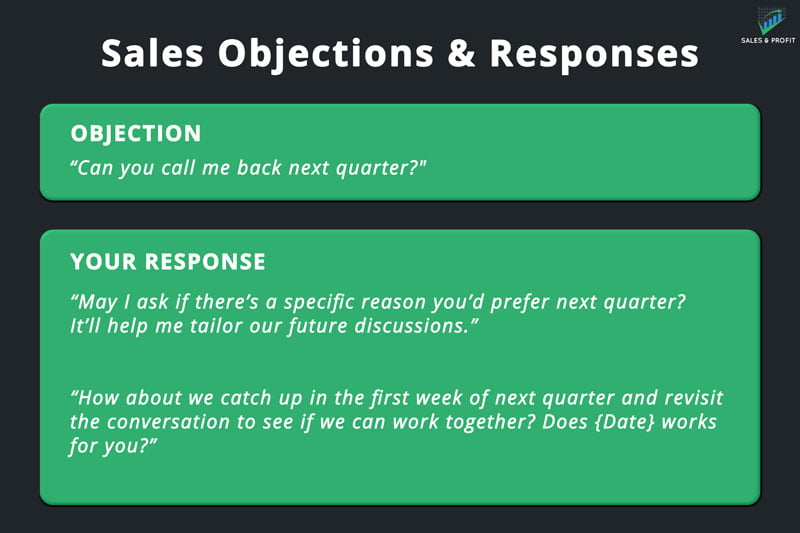
Why this objection arises?
When a prospect suggests pushing the conversation to the next quarter, it often indicates a few underlying factors.
They might have other immediate priorities, facing budget constraints, or they’re currently in the evaluation phase and aren’t ready to make a decision.
It’s also possible that they’re being polite and trying to avoid a direct ‘no.’
How to handle this objection?
You need to start by asking questions that will uncover the reason for the delay.
Also, ask the prospect what will change in the next quarter from their side so that they will consider your solution at that time.
And finally, you need to secure a specific date and time to speak in the next quarter.
Rebuttal Examples
- “May I ask if there’s a specific reason you’d prefer next quarter? It’ll help me tailor our future discussions.”
- “How about we catch up in the first week of next quarter and revisit the conversation to see if we can work together? Does {Date} works for you?”
32. "Its difficult for me to sell this internally"
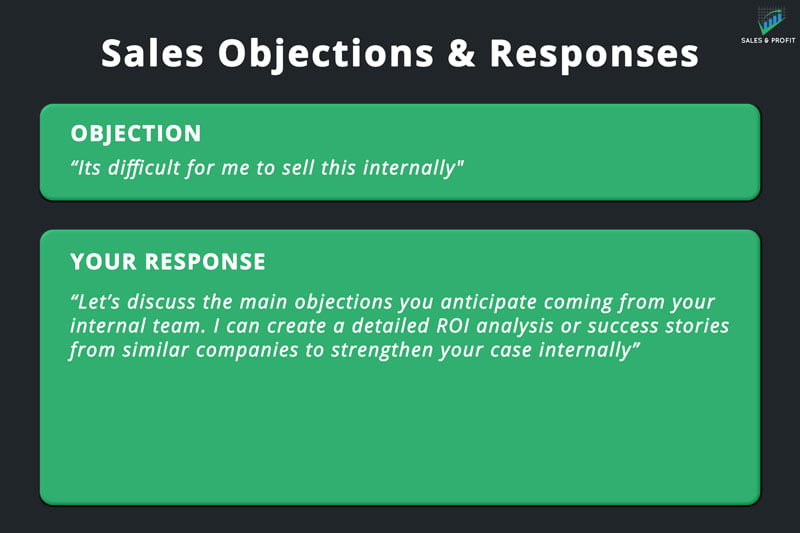
Why this objection arises?
This objection often indicates the prospect perceives a lack of alignment between your solution and their organization’s needs, priorities, or culture.
It could also hint at past experiences where they’ve faced resistance or pushback from stakeholders when introducing a similar solution.
How to handle this objection?
First, you need to understand the reason for the prospect’s hesitation.
Dive deeper to identify the specific challenges or objections they anticipate when presenting the solution to the internal team.
Offer to assist in crafting a compelling narrative that underscores the value proposition tailored to their company’s unique pain points.
Provide them with data, case studies, or testimonials that can bolster their internal pitch.
It’s also beneficial to understand the key decision-makers and stakeholders involved, so you can tailor your approach to address their specific concerns and objectives.
Assuming you are on good terms with the prospect, you can get valuable insights of their company.
Rebuttal Examples
- “Let’s discuss the main objections you anticipate coming from your internal team. I can create a detailed ROI analysis or success stories from similar companies to strengthen your case internally”
Free Webinar
How World Class Sales Professionals Handles Objections

Linnet Dave
Independent Sales Consultant - Sales & Profit
4 Steps to Handling Sales Objections (The AARC Framework)
Now that we’ve covered the common sales objections and their best rebuttals, let’s discuss the steps or techniques to overcome the sales objections and close more deals.
The AARC Framework
- Acknowledge (A)
- Ask and Uncover (A)
- Respond and Resolve (R)
- Check for Agreement (C)
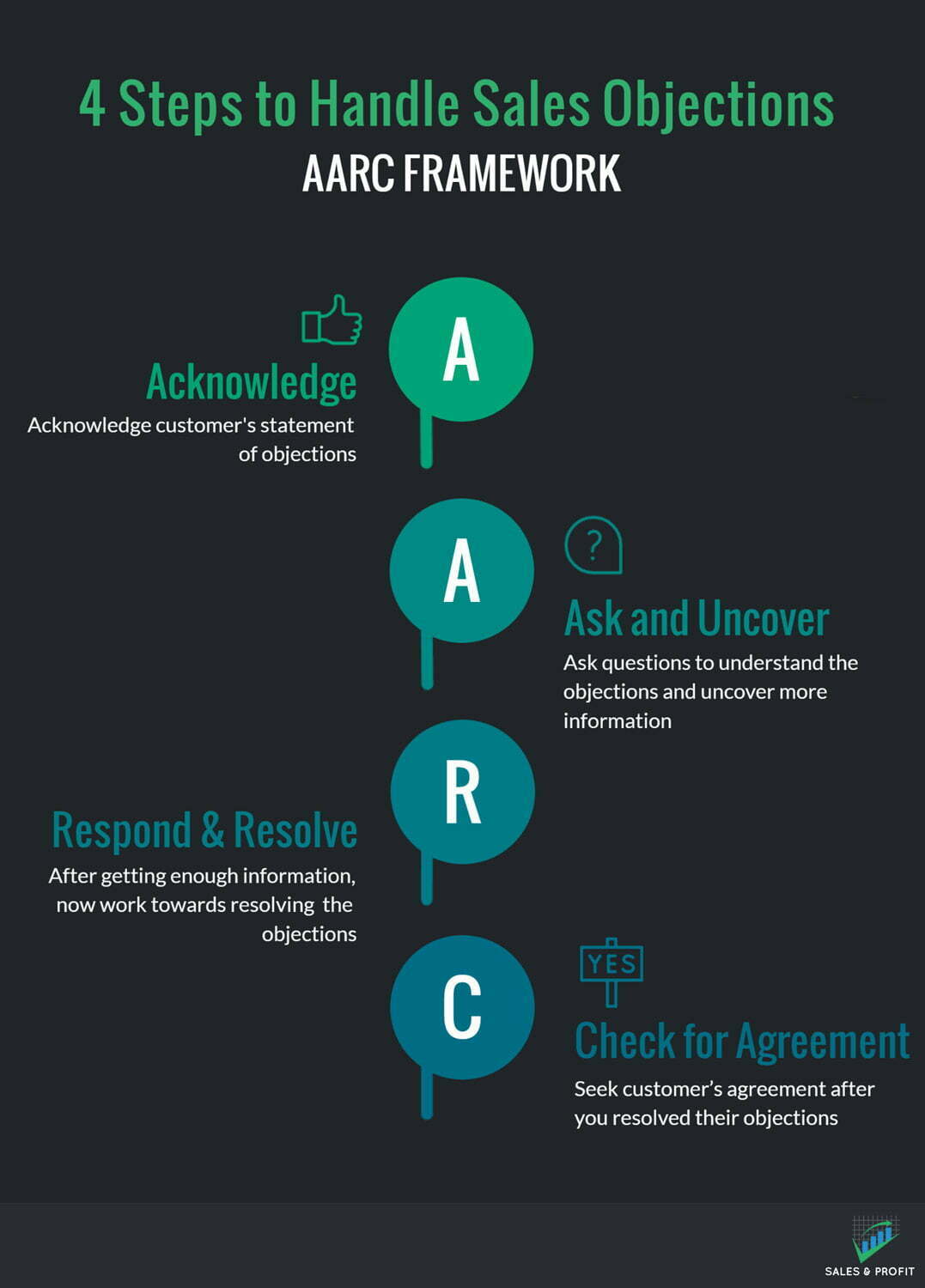
1. Acknowledge
Acknowledging customers’ objections is a way to convey that you respect their opinions or concerns.
When a customer would say “I’m happy with our current solution”, an average salesperson would start to defend their product.
But a great sales professional knows that the customer has the right to express their objections.
And therefore, they respect what the customer said and acknowledge their objections as a first step.
2. Ask and Uncover
Asking questions is a great way to continue the conversation going and uncover more information or reasons behind the objections.
For each of the 4 reasons of objections we discussed in this blog, the questions you ask could be different.
- Indifference: To uncover their current problems, impact of the problems and the gaps in their level of satisfaction with the current solution.
- Skepticism: Reasons for their doubt
- Misunderstanding: Source of their information
- Drawback: Priority of that need
3. Respond and Resolve
Once you have uncovered the reasons for objections now you can address their objections.
Again to resolve the 4 kinds of objections you can take different approaches to each
- Indifference: Offer a solution with benefits specific to their pain point.
- Skepticism: Offer relevant proofs.
- Misunderstanding: clarify with the right information.
- Drawback: See if there are other needs and if you can outweigh this drawback by supporting the other critical needs.
4. Check for Agreement
This one is pretty straightforward, it’s just seeking the customer’s agreement after you resolved their objections.
A few examples can be :
- Does it make sense?
- Are you ok with it?
- Does this sound good?
Objections are an integral part of the sales process.
While they are great opportunities to learn about customer & move forward in the relationship, any objections left unaddressed always comes back to haunt you later & often cost deals as opinions get more firm with time.
Great sales professional understands that, we live with consequences of choices we make & each time we make a choice, we evaluate options, the methodology of making a choice is very personal & is driven with comfort of the consequence of choice being made, this insight enables a controlled response & understanding of customers behavior the way it is, making each transaction different in nature.


